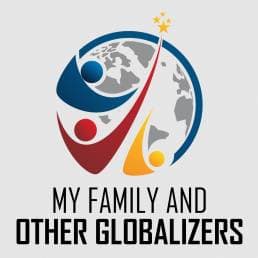



Note to readers: My Family and Other Globalizers is a weekly parenting column on bringing up global citizens.
As a mother of small children, I developed an inverted relationship to airplane travel. Before the birth of my bratskies, I’d hated plane journeys, like all good snobs. Airplane food tasted about as good as it looked, the legroom in economy made the cages of battery chickens appear spacious, and the interminable security queues had me grinding my teeth so hard that I’m sure any dentist in the vicinity would have been impelled to prescribe me a mouth guard.
 Enter Ishaan and Nicolas, and suddenly solo work travel that involved extended plane journeys became a longed-for scenario, an imagined refuge. I came to think of them as a utopia, where I would read entire novels projectile vomit-free, watch movies unscented by poopy diapers, or just allow myself to succumb to the unplanned pleasures of daydreaming. Even the airplane food was imagined as appetizing, simply by the fact that it could be eaten, instead of ending up painted on my face.
Enter Ishaan and Nicolas, and suddenly solo work travel that involved extended plane journeys became a longed-for scenario, an imagined refuge. I came to think of them as a utopia, where I would read entire novels projectile vomit-free, watch movies unscented by poopy diapers, or just allow myself to succumb to the unplanned pleasures of daydreaming. Even the airplane food was imagined as appetizing, simply by the fact that it could be eaten, instead of ending up painted on my face.
Unfortunately, this imagined utopia rarely came to pass. My daydreams inevitably morphed into nightmares about instructions I’d forgotten to give the nanny, or dreadful playground accidents that could see my offspring maimed for life. Had I remembered to tell my husband to pack a banana as a school snack? And even if I had, would he remember? And if he didn’t, would my beloved child become stunted with malnutrition?
Instead of reading long, intellectually challenging novels, I often found myself sneaking online to read about development milestones that the babes should have been hitting but were not. Other babies were walking by the time they were nine months old, while my first born had only just started to crawl as his first birthday came around. Even worse, other babies crawled with immaculate posture and advanced coordination, but Ishaan had developed a lopsided crab-like shuffle that was ungainly even to a mother’s biased eyes.
But my greatest fantasy around travel had to do with the thought of sleep. Ever since my kids had been born, I’d struggled to sleep through the night. Ishaan had been a colicky baby, his cries waking me up multiple times a night. And so, I’d become used to switching from deeply asleep to being on high alert, adrenaline coursing through my veins. This was the natural biological response to one’s baby’s cries, and Ishaan’s had been more like the screams of a tortured heretic at the hands of the Inquisition.
I always hoped that a sealed-off hotel room, far from any children waking up in the middle of the night complaining of nightmares/thirst/tummy ache, or desirous of nocturnal playing/singing/hunting for stuffed toys, would automatically equate peaceful slumber. Unhappily, I found my post-partum insomnia travelled with me. And no matter if I was in Copenhagen or New York with ne’er a child in sight, I slept poorly, all the more aggravated for having no excuse for my disturbed nights.
Exhaustion was, therefore, probably the single greatest difference between life Before and After baby for me. And this despite the fact that unlike the vast majority of women I had a nanny to help out and a job that required little physical labour.
I had dinner with a British friend, a mom of three boys, in Brussels one evening when she quipped about how she found it amusing to recall ever having complained of tiredness before she’d become a mother. “Do you remember complaining how tired you were before you had a child?” she’d smiled. And I’d found myself laughing so hard I'd had to put down my drink for fear of spilling it, even though it wasn’t a very funny joke. But perhaps that was precisely why I’d laughed so much.
Discover the latest Business News, Sensex, and Nifty updates. Obtain Personal Finance insights, tax queries, and expert opinions on Moneycontrol or download the Moneycontrol App to stay updated!
Find the best of Al News in one place, specially curated for you every weekend.
Stay on top of the latest tech trends and biggest startup news.